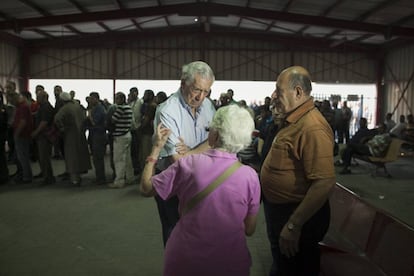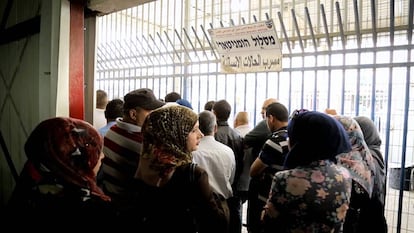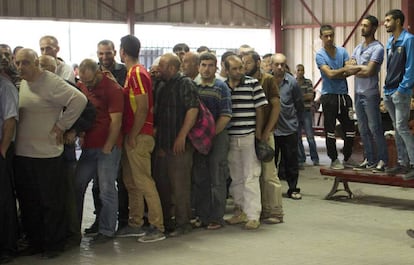The terror of the children
In part two of this special report, Nobel literature prizewinner Mario Vargas Llosa describes Israeli defense forces’ system to “prevent terror by sowing panic” among Palestinian children and youths

Salwa Duaibis and Gerard Horton are lawyers. Salwa is Palestinian and Gerard is half-British, half-Australian. As members of a humanitarian organization, they keep an eye on the military trials in Israel that deal with youngsters between the ages of 12 and 17 who are said to be a security threat. The morning I spent with them in Jerusalem was one of the most enlightening of my life.
Did you know that in 2012 not one settler in the West Bank was killed? Do you also know that the average number of crimes committed against settlers in the past five years was as low as 4.8 a year? The Occupied Territories are safer, in fact, for settlers than the streets of New York, Mexico or Bogotá are for their inhabitants. Taking into account that there are 370,000 settlers in the West Bank (half a million with east Jerusalem) compared to 2,700,000 Palestinians, we are talking about one of the least violent corners of the world, despite the gunfights, demolitions, terrorism and protests that we hear about in the news.
“It’s a real success for Israel’s Defense Forces, no doubt about it,” says Gerard. “Should we congratulate them?”
The accused – youngsters dressed in black with their heads almost shaved – listen in silence as their fate is decided
The only way to achieve such a low crime rate is by coldly and methodically imposing a strategy. Israel’s involves the systematic intimidation and psychological destabilization of children and teenagers between the ages of 12 to 17.
This is done by “demonstrating the ubiquitous presence” of the Israeli Defense Forces, “the cauterization of the conscience” and “simulated operations disturbing the peace”. In other words, generating panic to prevent terror. The method is different when it comes to adults, especially terror suspects, as it includes selective murder, torture, extended jail sentences, demolition and confiscation of property.
The army has intelligence agents working in the West Bank, as well as an efficient network of informers kept loyal through bribery or threat. Thanks to the informers, the agents have lists of the youngsters who demonstrate against the occupation and throw stones at the Israeli patrols.

The operations designed to induce panic are generally carried out at night by masked soldiers who first throw grenades into homes accompanied by shouting, with the aim of frightening families – above all, the children. These raids come out of the blue and are carefully orchestrated. The teenager or child who has been betrayed by an informer is blindfolded and handcuffed. The young suspects are then taken away in a truck, usually on the floor of the truck with the soldiers’ feet on top of them and the odd kick to keep them scared.
In the interrogation room, they are left tied up on the floor for five to 10 hours. This helps to lower their morale and frighten them further. The subsequent interrogation follows a pattern; they are advised to admit to throwing stones, which will get them no more than two or three months behind bars. Otherwise, they will have to wait seven or eight months for their case to go to trial, which could means a worse sentence.
Once the IDF have the youngsters’ full attention, there is a suggestion that they become informants. They may be warned they could be tortured or raped, abuses that are not usually carried out, except in exceptional circumstances. Often all that needs to be implied is that the army will come for their nearest and dearest – often their mother or sister. Some youngsters agree then to become informers and almost always come out of the experience confused and disgusted with themselves. According to those behind the procedure, this vulnerable state of mind reduces the potential threat posed by the youngster. It’s also quite likely to affect the entire family.
Sign up for our newsletter
EL PAÍS English Edition has launched a weekly newsletter. Sign up today to receive a selection of our best stories in your inbox every Saturday morning. For full details about how to subscribe, click here.
The object is not so much to identify the stone-throwers as to introduce an element of fear and insecurity into homes and villages through their children. Fearful of falling victim to one of these nighttime raids in which their homes will be trashed and their children arrested, families become less of a threat. Nonsensical rules, curfews, sudden changes to routine and daily upheavals are part of the same strategy. Confusion and upheaval make conspiracy harder. Thanks to the raids, the Palestinian population remains psychologically disarmed.
Palestinians are strictly forbidden from entering the settlers’ territory, which means their population is divided. The settlers meanwhile are connected by a modern network of roads that can generally only be used by the Israelis. The isolation of the Palestinians and the rapid communication between the settlers is another guarantee of security.
It is true that terrible crimes are sometimes committed against the settlers, but there are fewer victims than there are in the rest of the world from traffic accidents. In fact, Israel has shown that in the 21st century you can still be a colonial country and a safe country at the same time.
The trials are quick. Dressed in military attire, the judge speaks in Hebrew and an official translates what he says into Arabic
What happens when these children and teenagers finally end up in court? To find out, I went with Gerard and Salwa to a jail on the outskirts of Jerusalem, where military judges preside over the minors’ trials. Just to get in is a long, drawn-out affair; the searches and walk through the barred corridors under the gaze of security cameras reminded me what it’s like to go in and out of the Gaza Strip.
More interesting than the actual trials was speaking to the families of the accused. One woman from the village of Beit Fajjar told me that her 15-year-old son had spent seven months in jail and on the night he was arrested, the soldiers trashed everything in her home. She had to work extremely hard to get the fare to travel from her village to Jerusalem. But her eyes were full of happiness and she smiled constantly. Her son had served his sentence and she was expecting that any minute now – or in an hour, or two or three maybe – the judge would call her and tell her she could take him home.

Nobody else in the room was looking that happy. A tall man told me that he has two sons in prison, one 15 and the other 17, but that so far he has not been able to see them. It has taken him three days to get here from his village and he is not even sure that he will be able to speak to them. He has come with his daughter, a very young and shy girl who was beaten by the soldiers the night they kicked down the door to their home, because she forgot to show them the cellphone she had in her pocket, which they feared she had been filming them with.
The trials are quick. Dressed in military attire, the judge speaks in Hebrew and an official translates what he says into Arabic. Meanwhile, the lawyers speak in Arabic and are translated into Hebrew. The accused – youngsters dressed in black with their heads almost shaved – listen in silence as their fate is decided.
Suddenly a young girl, a sister of one of the accused, starts to wail. From his bench, her brother begs her with his eyes and hands to calm down in case she makes things worse.
English version by Heather Galloway.
Tu suscripción se está usando en otro dispositivo
¿Quieres añadir otro usuario a tu suscripción?
Si continúas leyendo en este dispositivo, no se podrá leer en el otro.
FlechaTu suscripción se está usando en otro dispositivo y solo puedes acceder a EL PAÍS desde un dispositivo a la vez.
Si quieres compartir tu cuenta, cambia tu suscripción a la modalidad Premium, así podrás añadir otro usuario. Cada uno accederá con su propia cuenta de email, lo que os permitirá personalizar vuestra experiencia en EL PAÍS.
¿Tienes una suscripción de empresa? Accede aquí para contratar más cuentas.
En el caso de no saber quién está usando tu cuenta, te recomendamos cambiar tu contraseña aquí.
Si decides continuar compartiendo tu cuenta, este mensaje se mostrará en tu dispositivo y en el de la otra persona que está usando tu cuenta de forma indefinida, afectando a tu experiencia de lectura. Puedes consultar aquí los términos y condiciones de la suscripción digital.









































